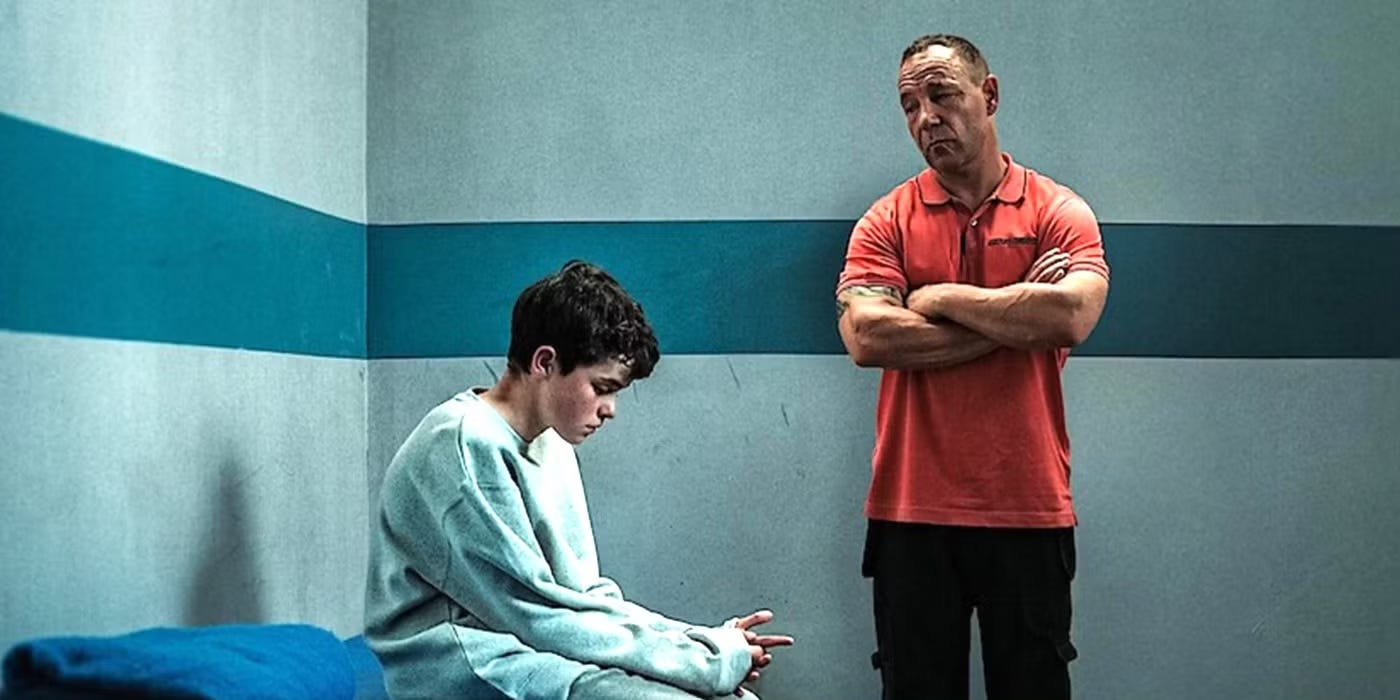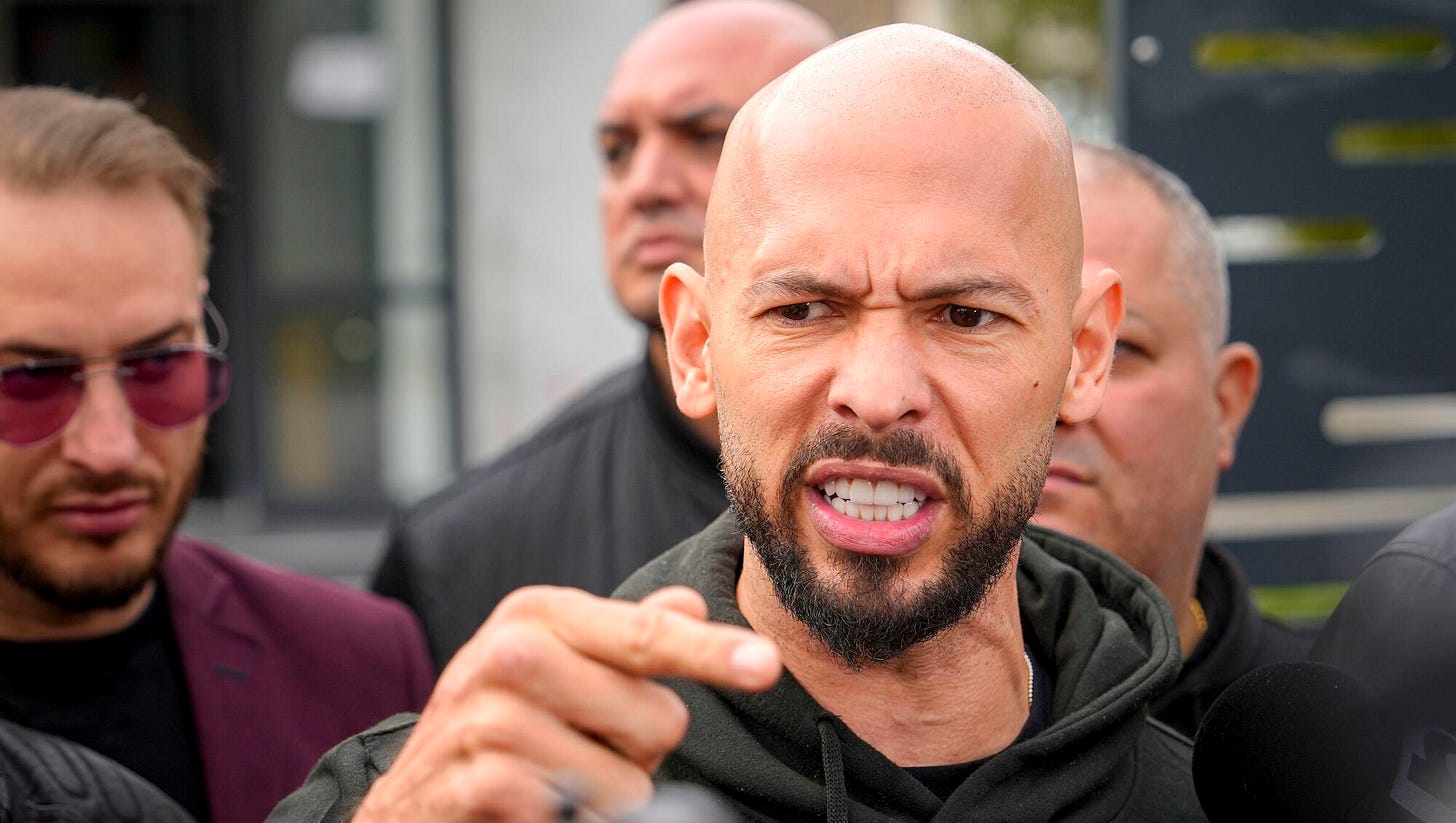The other day someone asked me which scene in Adolescence hit me the hardest.
Not an easy question, because the Netflix series the world can't stop talking about serves up a flurry of gut punches across its four episodes. But I didn't have to think long to come up with an answer …
The scene comes early in the opening episode. Thirteen-year-old Jamie is sitting alone with his father, Eddie, in a police interrogation room. Accused of murdering a schoolmate, he looks dazed and terrified. Then he begins to sob.
Eddie leans over to embrace his son, but then stops, again and again, as if repelled by an invisible force-field.
The space between the two is small, yet feels unbridgeable. We learn later that Eddie is a committed father. But in his son's hour of need he falls at the first hurdle: He is unable to give Jamie the loving embrace he so obviously needs.
Human touch is the most simple and visceral way to show affection, and Eddie cannot do it. The best he can manage is some gruff, manly advice: "Eat your cornflakes".
Eventually, at the very end of the episode, after watching the video proving Jamie's guilt, and after a little more will-they-won't-they kabuki, the two finally collapse into each others arms. But by then the dynamic is clear: father and son are locked in their own version of the Tower of Babel. They want to show affection yet lack the language (verbal and physical) to do so.
I found the scene quietly devastating. And it stuck with me, because that gap between Eddie and Jamie is not just a plot point: it’s a pattern. Many fathers and sons struggle to connect and communicate – to the detriment of both.
Adolescence in general – and this scene in particular – got me thinking about the current state of boys, and about my own father and son. Let’s start with the former.
These days, many boys are struggling to find their footing in the world. Much of the blame is put on absent fathers. Research has shown that boys raised without a live-in dad are more likely to fall into bad behaviour and less likely to thrive.
Yet just living in the home is not enough for fathers. How you show up as a dad matters, too. Recent research suggests that teenage boys’ mental and emotional development is enhanced by having a father who expresses his love for them through words and touch. One stand-out benefit: they become better at handling the aggression that stalks male adolescence.
Cuddling, hugging and kissing our sons is easy when they are small, sweet and smooth. It's tougher once their voices deepen and the facial hair sprouts, when they start fretting about being tough and cool, when they retreat into a monosyllabic shell. But that is precisely when they most need our physical affection.
Continuing to embrace your son through his adolescence sets a healthy example. At a time when he's working out what it means to be a man, it teaches him that it's okay to show emotion, to be vulnerable, to need, feel and express love.
What happens when fathers hold back, when all they offer is stoic encouragement and laddish jokes? Others rush in to fill the void. And they don't fill it with love; they fill it with hate. Just look at the bile peddled by influencers like Andrew Tate.
Adolescence took me back to my own teenage years. It was western Canada in the 1980s, so not a time or a place for touchy-feely dads. But my father was different, perhaps because he grew up in the tropics.
He never stopped kissing and hugging me. At the time, it felt like just another quirk of my immigrant parents, like listening to the BBC or eating supper late. When his displays of physical affection happened within the family, I was fine with them. But when my father got touchy-feely in public, it made me wince.
Much of my adolescence was spent playing street hockey in front of our house. If my father returned from work in the middle of a game, I would station myself far enough away to minimise the chance of being kissed in front of everyone. Like a pimply Peter denying Jesus.
If my father noticed this subtle rejection, he never let on, and he certainly never stopped the loving embraces. And today I am grateful for that.
Looking back on those moments of adolescent shame, I feel adult shame. Because I realise now that my father was giving me the greatest gift a dad can give to his son: a vision of manhood where strength and tenderness not only co-exist; they feed each other. You can be tender because you are strong, and being tender makes you stronger.
That is a hard case to make with words to a teenage boy. It's easier to show him by putting those words into action.
That is how I brought up my own son. I modelled strength through work and sports, while also showing my softer side. I did not hide my setbacks or conceal tears shed while watching sad films. I often pulled him in for a hug, sometimes in front of his friends.
Result: that distance between Eddie and Jamie does not exist between us. I know that because, during his adolescence, when my son was worried about things he was hearing or seeing or feeling, he would come to me to talk it through.
Now 26 years old, he is stronger, faster and hairier than I am. But we are still at ease in each other's arms. Recently, after he submitted his PhD thesis, I gave him a long hug and a kiss, and told him how proud I was.
My book, Under Pressure, is a blueprint for raising children in a fast world. Its central argument is that parents need to slow down and be present. That's how you listen, feel, connect, learn, love. It's how you help your children find themselves and their place in the world.
The good news is it's never too late to slow down as a father. Adolescence is a dark watch but towards the end it serves up a shaft of light. It comes in a scene between the detective, Luke, and his son, Adam. The pair have an uneasy relationship.
With his bulging muscles, Luke radiates alpha-male strength. He looks like he could kick Andrew Tates' ass. But after spending time with Eddie and Jamie, he is ready to lower is fists and open his heart.
So he invites his son to go get some chips. At first, Adam brushes away the olive branch, assuming work comes first. "You’ve got your case," he says. Then Luke signals that he wants to start a new chapter. “I’ve got some free time," he says. "I want to spend it with you because I love you.”











That scene you described in the film was so poignant. Thank you for sharing your take on fatherhood and parenting.
good one Carl! Here was my parallel take, below. We could do a long 2-hander on this one...
https://www.forbes.com/sites/avivahwittenbergcox/2025/04/05/3-reasons-why-adolescence-hit-homein-80-countries/